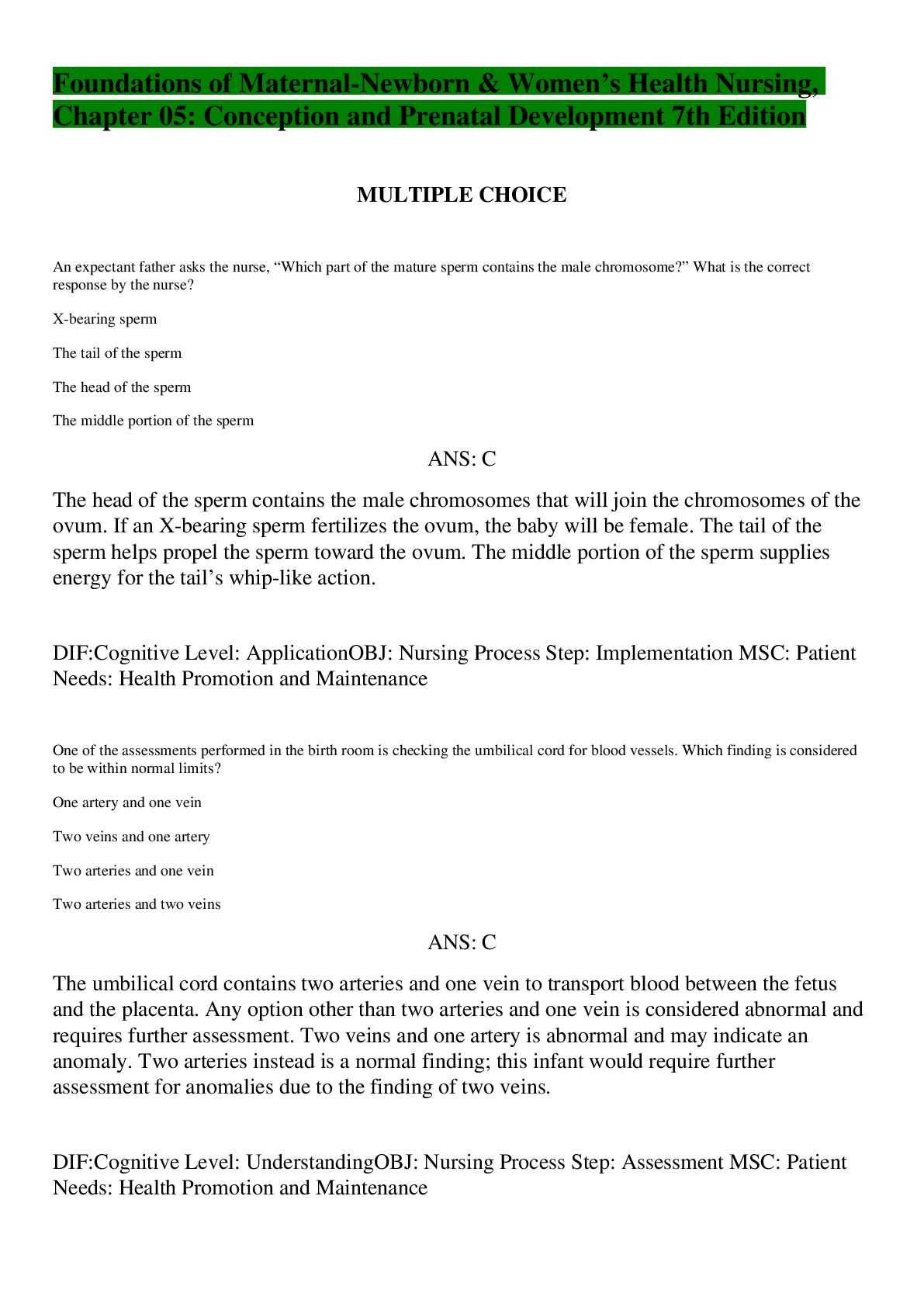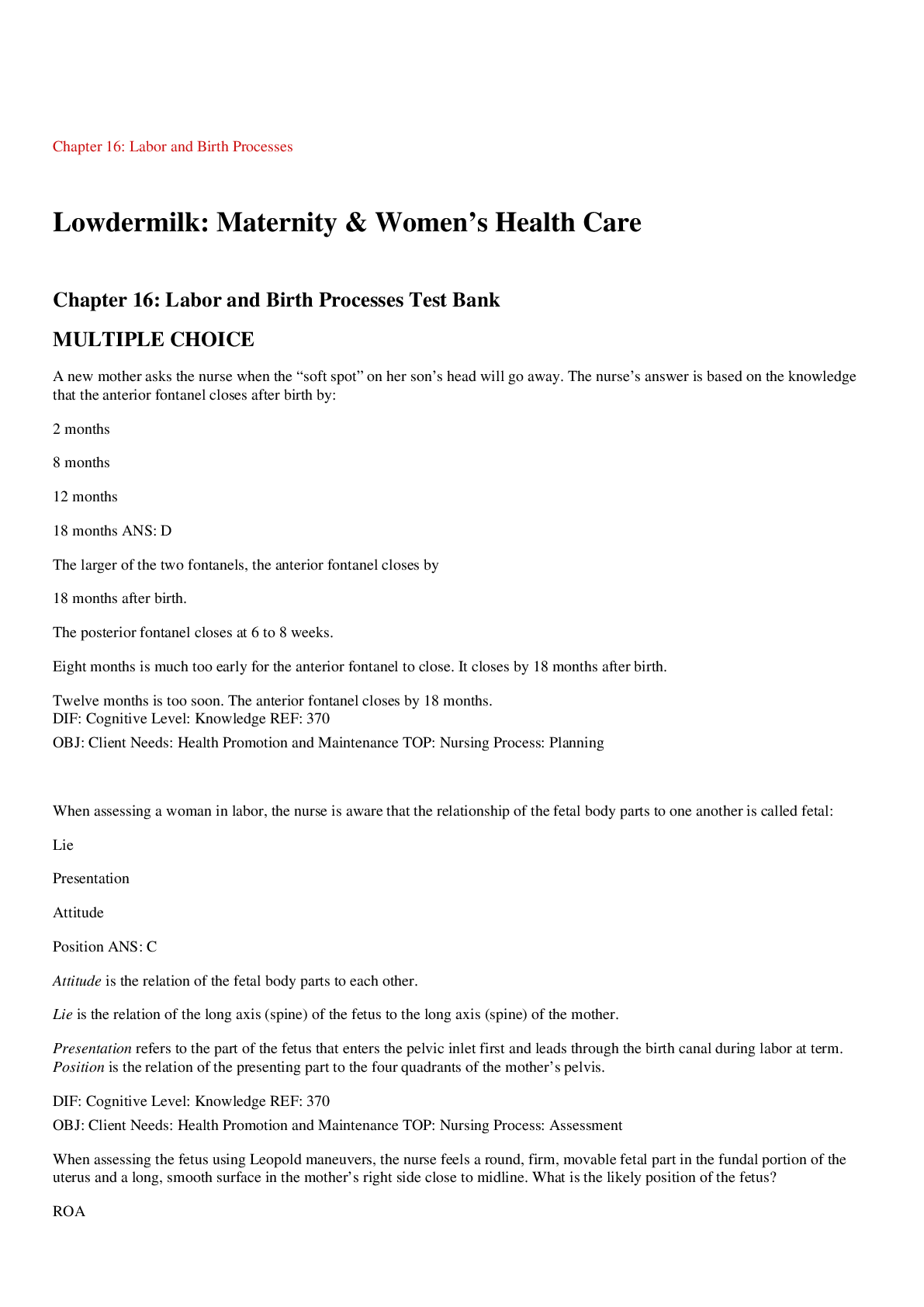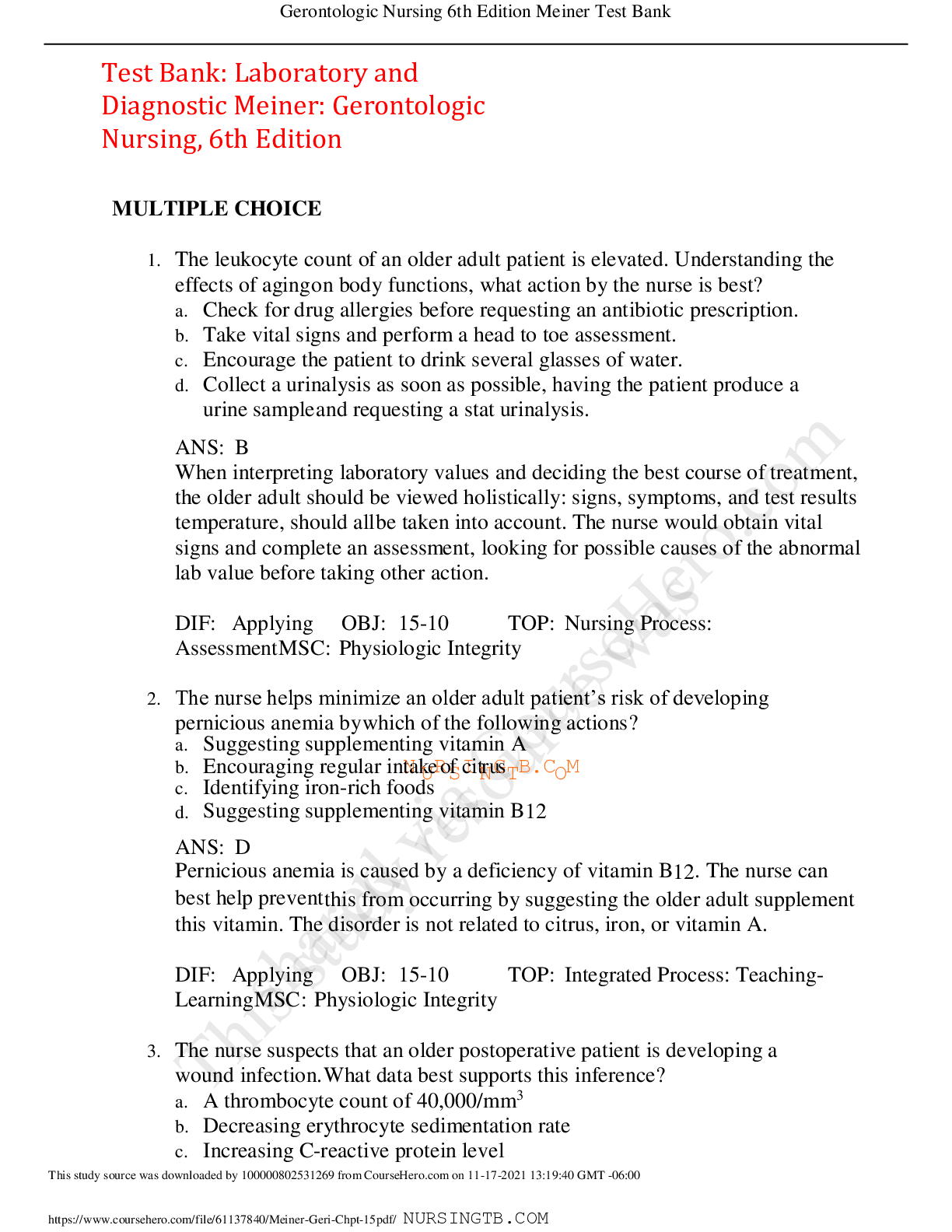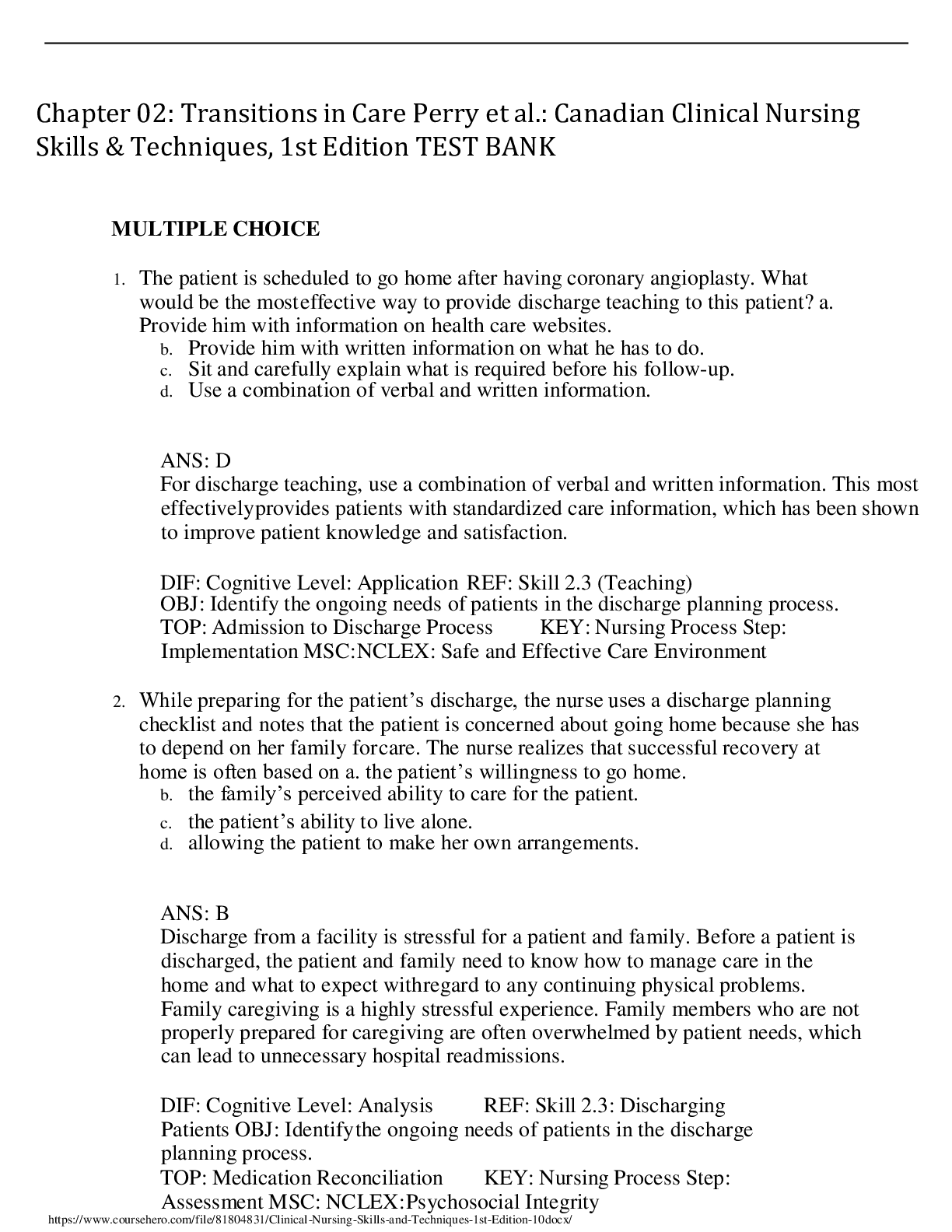*NURSING > TEST BANK > Test Bank: Models for Working With Psychiatric Patients Keltner : Psychiatric Nursing, 8th Edition, (All)
Test Bank: Models for Working With Psychiatric Patients Keltner : Psychiatric Nursing, 8th Edition,100% CORRECT
Document Content and Description Below
Test Bank: Models for Working With Psychiatric Patients Keltner : Psychiatric Nursing, 8th Edition MULTIPLE CHOICE 1. When interacting with patients, it is important for the nurse to recogniz... e that defense mechanisms are used for what outcome? a. Keep id impulses from gaining control. b. Protect the ego from excessive anxiety. c. Access unconscious feelings and memories. d. Prevent conflict among the id, ego, and superego. ANS: B Theorists widely accept the Freudian concept that ego defense mechanisms operate unconsciously to lower anxiety. The function of defense mechanisms is limited to anxiety control, so the other options are incorrect. DIF: Cognitive level: Understanding TOP: Nursing process: Planning MSC: Client Needs: Psychosocial Integrity 2. A nurse plans an intervention to support a patient’s ego. What makes supporting ego a therapeutic intervention? a. It provides rational, logical reality testing. b. It is primarily concerned with right and wrong. c. It uses primary process imagery to meet basic needs. d. It is derived from the indNividRual’Is paGtterBn .ofCthinMking. ANS: A U S N T O The ego focuses on the reality principle and uses secondary-process thinking, a logical, rational operation to maintain the well-being of the individual. The superego is concerned with right and wrong. The id uses primary process. Ego formation is influenced by heredity, environment, and maturation. DIF: Cognitive level: Understanding TOP: Nursing process: Planning MSC: Client Needs: Psychosocial Integrity 3. A patient asks, “Why is it important to uncover memories and conflicts hidden in the unconscious?” According to Freud, what effect does this intervention support? a. Resolves developmental issues, fears, and crises. b. Allows an individual control over the id and superego. c. Suppress painful feelings and increase rational thinking. d. Provides insight into behavior and allow meaningful change to occur. ANS: D Freud believed that uncovering unconscious material generates an understanding of behavior that enables individuals to make choices about behavior and thus improve mental health. It will not, however, automatically resolve issues, give the patient control over id and superego strivings, or result in rational thinking. DIF: Cognitive level: Understanding TOP: Nursing process: Implementation MSC: Client Needs: Psychosocial Integrity 4. A patient uses defense mechanisms excessively. The nurse should expect to find evidence that the patient is demonstrating what resulting effect? a. The patient has difficulty with problem-solving. b. The patient has an increased risk for psychosis. c. The patient’s emotions are experienced with great intensity. d. The patient regularly denies reality. ANS: A Excessive use of defense mechanisms results in the distortion of reality. When reality is not perceived accurately, problem-solving is impaired. The other options are not generally associated with defense mechanism use. DIF: Cognitive level: Understanding TOP: Nursing process: Assessment MSC: Client Needs: Psychosocial Integrity 5. A patient experiencing severe panic attacks uses denial, repression, and displacement. Which nursing statement reflects an appropriate intervention regarding this patient’s needs? a. “We are going to focus on exposing you to more effective coping strategies.” b. “You will benefit from setting limits on use of the defense mechanisms.” c. “We will discuss the benefit of changing values and beliefs.” d. “Let’s discuss helping you uncover the unconscious conflicts causing you trouble.” ANS: A A desired outcome would be that the patient will use more effective coping strategies. Nursing intervention would focus on helping the patient identify and use more adaptive coping strategies. Setting limits on the use of defense mechanisms is impossible. Values clarification might be unnecessary. UncovNeUrinRgScIonNflGicTtsBis.nCoOt aMfocus of nursing intervention. DIF: Cognitive level: Analyzing TOP: Nursing process: Implementation MSC: Client Needs: Psychosocial Integrity 6. A young adult who has few interpersonal relationships, says, “Most people can’t be trusted.” This person makes decisions only after consulting with his parents. Using Erikson developmental theory, the nurse can draw which conclusion? a. The patient has evidence of inferiority and lacks a sense of direction. b. Developmental deficits in early life have impaired the patient’s adult functioning. c. The patient’s developmental problems will probably lead to a serious mental illness. d. It is impossible for the patient to proceed to the next developmental stage until mastering earlier stages. ANS: A The patient achieved only partial mastery of the trust-versus-mistrust stage. Deficits in development carried from one stage to the next interfere with functioning at the adult level. Individuals do progress from stage to stage when mastery is not attained; however, adjustment is usually impaired. Developmental problems might lead to a serious mental disorder but might also produce less serious results. DIF: Cognitive level: Analyzing TOP: Nursing process: Assessment MSC: Client Needs: Health Promotion and Maintenance 7. When the nurse conducts a developmental assessment with a new patient, the assessment can be expected to yield information regarding what patient characteristic? a. The use of defense mechanisms b. The degree of mastery of critical tasks c. Strategies to help the patient make rational decisions d. The mobilization of defenses against the patient’s stressors ANS: B According to Erikson developmental theory, a developmental assessment is conducted for the purpose of determining the extent to which an individual has successfully mastered the critical task of each stage of development up to his or her chronologic age. Lack of mastery or partial mastery will yield clues about issues to be addressed in working with the patient. Because of its focus, the developmental assessment might yield only minimal information about defense mechanism use and defenses used to cope with stress. Rational decision making is not expected to be fostered as a result of developmental assessment. DIF: Cognitive level: Understanding TOP: Nursing process: Assessment MSC: Client Needs: Health Promotion and Maintenance 8. A patient diagnosed with lung cancer continues to smoke and says, “I think my cancer is more the result of a bad gene than of smoking.” The patient shows the use of which defense mechanism? a. Denial b. Compensation c. Intellectualization d. Reaction formation ANS: A NURSINGTB.COM Denial is the unconscious refusal to admit an unacceptable idea or behavior, as shown in this example. Compensation refers to covering a weakness by overemphasizing a desirable trait. Intellectualization involves using a logical explanation without expressing emotion or affect. Reaction formation is a conscious behavior that is the opposite of an unconscious feeling. DIF: Cognitive level: Understanding TOP: Nursing process: Assessment MSC: Client Needs: Psychosocial Integrity 9. A patient tells the nurse, “The reason I use drugs is because everybody nags me to do things that don’t interest me.” The patient shows use of which defense mechanism? a. Sublimation b. Introjection c. Identification d. Rationalization ANS: D Rationalization is an attempt to prove that one’s behaviors or feelings are justifiable and involves making justifications of feelings or behaviors. Sublimation channels instinctual drives into acceptable channels. The patient is not modeling after another person or incorporating another’s values. DIF: Cognitive level: Understanding TOP: Nursing process: Assessment MSC: Client Needs: Psychosocial Integrity 10. A patient is mute, curled in a fetal position, and incontinent of urine. The patient eats small amounts only if spoon-fed. The nurse assesses this behavior as most indicative of what defense mechanism? a. Displacement b. Compensation c. Conversion d. Regression ANS: D Regression is defined as the return to an earlier, more comfortable developmental state—in this case, infancy. Displacement involves discharging feelings to an object that is less threatening. Compensation refers to covering a weakness by overemphasizing a desirable trait. Conversion refers to the unconscious expression of conflict symbolically through physical symptoms. DIF: Cognitive level: Understanding TOP: Nursing process: Assessment MSC: Client Needs: Psychosocial Integrity 11. A young adult has a realistic sense of self, a commitment to reasonable career goals, a satisfying intimate-partner relationship, and a circle of loyal friends. This person says, “I volunteer for important projects in my community.” The nurse can draw which conclusion? a. There is lack of mastery of critical tasks associated with the stage of industry versus inferiority. b. Mastery of critical tasks associated with the stage of identity versus role diffusion is evident. c. Fear of criticism and affection affect mastery of critical tasks associated with intimacy. NURSINGTB.COM d. The person vacillates between dependence and independence. ANS: B Adult behavior reflecting mastery of the critical tasks associated with the stage of identity versus role diffusion includes confident sense of self, emotional stability, commitment to career planning, sense of having a place in society, establishing a relationship with the opposite sex, fidelity to friends, and development of personal values. The behaviors given in the scenario are not indicators of any of the other options. DIF: Cognitive level: Analyzing TOP: Nursing process: Assessment MSC: Client Needs: Health Promotion and Maintenance 12. A young adult reports overwhelming guilt about minor social errors, feels self-pity, and says, “I stay on the sidelines of life so I can avoid the embarrassment of being noticed.” The nurse can assess deficits in mastery of critical tasks associated with which developmental stage? a. Trust versus mistrust b. Industry versus inferiority c. Autonomy versus shame and doubt d. Generativity versus self-absorption ANS: B Adult behaviors reflecting developmental problems associated with the stage of industry versus inferiority include excessive guilt and embarrassment, passivity, apathy, rumination and self-pity, assumption of the victim role, and underachievement of potential. The behaviors given in the scenario reflect the critical tasks of industry versus inferiority. Tasks of the other stages are entirely different. DIF: Cognitive level: Analyzing TOP: Nursing process: Assessment MSC: Client Needs: Health Promotion and Maintenance 13. An older retired executive reports, “I am unable to say ‘no’ when asked to help with community causes. These projects overtax my strength, but if I don’t do them, who will?” The nurse can assess that this person is having difficulty with critical tasks related to which developmental stage? a. Trust versus mistrust b. Integrity versus despair c. Identity versus role diffusion d. Autonomy versus shame and doubt ANS: B Adult behaviors reflecting problems associated with the developmental stage of integrity versus despair include inability to reduce activities, overtaxing strength, and feeling indispensable, or the opposite: feeling helpless, useless, or lonely; focusing on past mistakes; and inability to occupy oneself with satisfying activities. Tasks of the other stages are not described in the scenario. DIF: Cognitive level: Understanding TOP: Nursing process: Assessment MSC: Client Needs: Health Promotion and Maintenance NURSINGTB.COM 14. The nurse who uses the interpersonal model as a basis for practice will focus assessment on identifying which patient issue? a. Intrapsychic conflicts b. Relationship problems c. How the environment affects behavior d. The patient’s achievement of development tasks ANS: B Interpersonal therapists assess for current difficulties in the patient’s relationships with others. Learning new, more effective interpersonal skills becomes a goal of therapy. Psychoanalytic therapists focus on intrapsychic conflicts. The other options are not the focus of the model. DIF: Cognitive level: Understanding TOP: Nursing process: Planning MSC: Client Needs: Health Promotion and Maintenance 15. When a nurse uses the interpersonal model as a basis for practice, which goal is most appropriate for the patient care plan? a. The patient will develop mature, satisfying relationships that are relatively free of anxiety. b. The patient will rid himself of irrational beliefs, including “shoulds,” “oughts,” and “musts.” c. The patient will learn to meet basic needs responsibly. d. The patient will manage stress adaptively. ANS: A The goal of interpersonal therapists is to assist the patient in developing healthy interpersonal relationships that are relatively anxiety-free. The other distracters state a goal appropriate for cognitive therapy, reality therapy, and stress management therapy, respectively. DIF: Cognitive level: Analyzing TOP: Nursing process: Planning MSC: Client Needs: Psychosocial Integrity 16. The parent of a 26-month-old child says, “My child refuses toilet training and shouts ‘No!’ when given direction. What do you think is wrong?” Select the nurse’s best reply. a. “This is normal for your child’s age. The child is striving for independence.” b. “The child needs firmer control. Punish the child for defiance and saying ‘no.’” c. “There may be developmental problems. Most children are toilet trained by age 2.” d. “Some undesirable attitudes are developing. A child psychologist can help you develop a remedial plan.” ANS: A The distracters indicate that the child’s behavior is abnormal when, in fact, this behavior is typical of a child around the age of 2 years whose developmental task is to develop autonomy. DIF: Cognitive level: Applying TOP: Nursing process: Implementation MSC: Client Needs: Health Promotion and Maintenance 17. What should be the initial assessment in the rational-emotive therapy process implemented to help the chronically depressed patient? a. Presence of developmental tasks and progress b. The management of enviNronmRenItal sGtresBso.rsC M c. The childhood influences oUn thSe paNtienTt’s emoOtional state d. The presence of irrational beliefs related to painful feelings ANS: D Cognitive therapists believe that irrational beliefs or automatic thoughts cause self-defeating behaviors to be maintained. Individuals can challenge their self-defeating behaviors once they identify irrational beliefs and see their connection to painful feelings. The other options reflect interventions that might occur later. DIF: Cognitive level: Analyzing TOP: Nursing process: Implementation MSC: Client Needs: Psychosocial Integrity 18. A patient says, “It’s my fault because I always make bad decisions. I should never have taken that job.” Using a rational-emotive approach, how would the nurse respond? a. “What can you do to help yourself solve your problems at work?” b. “You’re experiencing a great deal of stress right now. How can you manage it more effectively?” c. “Can you describe a time in your childhood when your parents blamed you for things you didn’t do?” d. “Consider the words you are using to talk about yourself. Let’s try to change those words to more positive ones.” ANS: D The therapist using rational-emotive therapy helps the patient identify irrational thoughts and replace them with new, more positive self-statements to enable the patient to think, feel, and behave differently. The other options do not make use of the combination of cognitive, emotive, and behavioral components. DIF: Cognitive level: Analyzing TOP: Nursing process: Implementation MSC: Client Needs: Psychosocial Integrity 19. During an interdisciplinary team meeting, a nurse shares that, “The patient’s psychological distress seems to result from automatic thoughts that cause self-defeating behaviors.” The nurse is conceptualizing the patient’s problem from the viewpoint of which model? a. Interpersonal b. Psychoanalytic c. Stress-adaptation d. Cognitive-behavioral ANS: D The cognitive-behavioral model recognizes the role of automatic thoughts (irrational beliefs) in promulgating self-defeating behaviors. The information given in the scenario does not reflect conceptualization using any of the other models. DIF: Cognitive level: Understanding TOP: Nursing process: Analysis MSC: Client Needs: Psychosocial Integrity 20. Which statement by an adult would lead a nurse to suspect deficits in mastery of the developmental task of infancy? a. “I wish I had more warm and close friendships.” b. “I am afraid to let anyoneNrUeaRllSy IgeNt GtoTkBno.wCmOeM.” c. “I am always right. Keep your opinion to yourself.” d. “I am not ashamed of cheating at work.” ANS: B According to Erikson, the developmental task of infancy is the development of trust. The only statement clearly showing the lack of ability to trust others mentions being “afraid to let anyone really get to know me.” The distracters suggest that the developmental task of infancy was successfully completed: rigidity rather than mistrust, and failure to resolve the crisis of initiative versus guilt. DIF: Cognitive level: Analyzing TOP: Nursing process: Assessment MSC: Client Needs: Health Promotion and Maintenance 21. A student nurse says, “I don’t need to interact with my patients. I learn by observing them.” The instructor can best interpret the nursing implications of Sullivan theory to this student by responding which statement? a. “Nurses cannot be isolated. We must interact to provide patients with opportunities to practice interpersonal skills.” b. “Observing patient interactions can help you formulate priority nursing diagnoses and appropriate interventions.” c. “I wonder how accurate your assessment of the patient’s needs can be if you do not interact with the patient.” d. “It is important to note patient behavioral changes because these signify changes in personality.” ANS: A Sullivan believed that the nurse’s role includes educating patients and assisting them in developing effective interpersonal relationships. Mutuality, respect for the patient, unconditional acceptance, and empathy are cornerstones of Sullivan theory. These cornerstones cannot be demonstrated by the nurse who does not interact with the patient. Observations provide only objective data. Priority nursing diagnoses usually cannot be accurately established without subjective data from the patient. The other distracters relate to Maslow theory and behavioral theory. DIF: Cognitive level: Applying TOP: Nursing process: Implementation MSC: Client Needs: Psychosocial Integrity 22. An individual diagnosed with alcohol dependence will begin motivational enhancement therapy. The nurse will explain this therapy to significant others as a way of achieving what patient goal? a. Altering the patient’s irrational thoughts b. Enhancing the patient’s willingness to change behavior c. Managing the patient’s anxiety through satisfying interpersonal interactions d. Mastering critical developmental tasks the patient did not attained earlier in life ANS: B This variation of cognitive-behavioral therapy uses motivational interviewing to bolster the patient’s readiness and willingness to change habits related to the addiction. Motivational enhancement therapy is a nonconfrontational approach that uses empathy and promotes self-efficacy. The other options are consistent with interpersonal therapy, cognitive therapy, and the use of Erikson modelN. URSINGTB.COM DIF: Cognitive level: Understanding TOP: Nursing process: Implementation MSC: Client Needs: Psychosocial Integrity 23. After an episode of self-mutilation, a patient diagnosed with borderline personality disorder will begin individual therapy and group skills training. The goals are to decrease use of dissociation, increase distress tolerance, and regulate affect. Which type of therapy is evident? a. Rational-emotive behavioral b. Motivational enhancement c. Dialectical behavioral d. Interpersonal ANS: C Each of the components described in the scenario is a component of dialectical behavioral therapy. The scenario information is not consistent with the components of any of the other types of therapy given as options. DIF: Cognitive level: Understanding TOP: Nursing process: Implementation MSC: Client Needs: Psychosocial Integrity MULTIPLE RESPONSE 1. A student goes to a party the night before a test and then fails the exam. After seeing the score, the student slams a book on the table and says, “I have to work so much and have no time to study. It wouldn’t matter anyway because the teacher is unreasonable.” The nurse identifies use of which defense mechanisms? (Select all that apply.) a. Denial b. Compensation c. Rationalization d. Projection e. Displacement f. Reaction formation ANS: C, D, E The student slams down the book, displacing anger, rationalizes (makes excuses), and projects blame onto the teacher. Compensation involves making up for a perceived weakness by emphasizing a desirable trait. Projection refers to blaming others or attributing unacceptable thoughts or behaviors to others. Reaction formation involves doing the opposite of an unacceptable desire. DIF: Cognitive level: Understanding TOP: Nursing process: Assessment MSC: Client Needs: Psychosocial Integrity 2. After being informed of a diagnosis of lung cancer, a patient says in a cheerful voice, “I feel fine. I will do some reading online about it. Right now, I want to take a nap.” The nurse assesses the use of which defense mechanisms? (Select all that apply.) a. Repression b. Undoing c. Introjection d. Reaction formation e. Intellectualization f. Suppression ANS: D, E, F NURSINGTB.COM The cheerful voice is probably the result of reaction formation. The wish to read more about the diagnosis reflects intellectualization. Taking a nap is suppression and allows the patient to avoid having to think about the problem. Repression results in unconscious forgetting. Undoing involves doing something to make up for an unacceptable act. Introjection is incorporating values and attitudes of others as if they were one’s own. DIF: Cognitive level: Understanding TOP: Nursing process: Assessment MSC: Client Needs: Psychosocial Integrity [Show More]
Last updated: 1 year ago
Preview 1 out of 17 pages
Instant download

Buy this document to get the full access instantly
Instant Download Access after purchase
Add to cartInstant download
Reviews( 0 )
Document information
Connected school, study & course
About the document
Uploaded On
Oct 13, 2021
Number of pages
17
Written in
Additional information
This document has been written for:
Uploaded
Oct 13, 2021
Downloads
0
Views
50





















